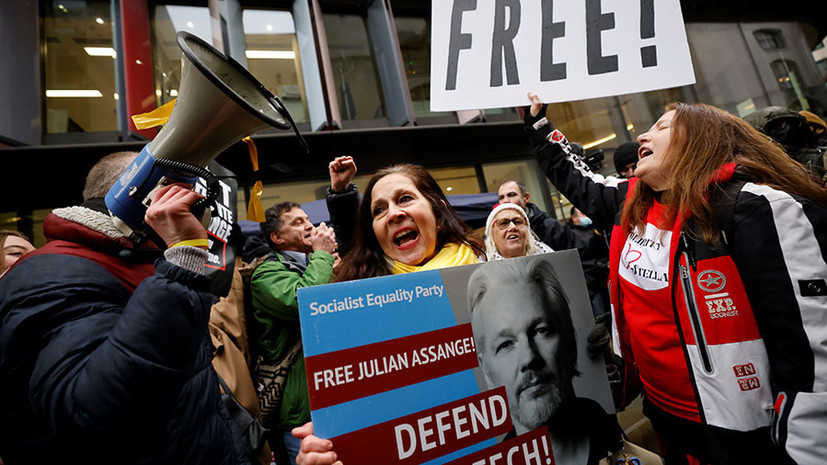The London court refused to release on bail the journalist, founder of WikiLeaks Julian Assange, he will remain in prison pending a US appeal on the extradition case.
Judge Vanessa Baraitser said during the hearing that Assange's past behavior suggests that if released, he might try to abscond.
“I am convinced that there are substantial grounds to believe that Mr. Assange will not appear in court for an appeal if today he is released,” TASS quoted her as saying.
Baraitser noted that the United States should be able to challenge its decision to refuse to extradite the defendant, and in the event of his escape, the American side will not be able to do this, RIA Novosti reports.
She also added that the conditions in the American prison, which became one of the reasons for the refusal to extradite the founder of WikiLeaks, differ significantly from those in Belmarsh prison, where Assange is being held.
During the meeting, the prosecution, in particular, recalled that in 2012 Assange took refuge in the Ecuadorian Embassy in London and asked for political asylum, thereby violating the conditions of bail.
In turn, the defense insisted that after the refusal to extradite their client to the United States, Assange had no reason to disengage from the trial.
It was also noted that the journalist, being in prison, is at risk of contracting the coronavirus, has poor health, and is also unable to see his children and bride.
We will remind, on January 4, the Westminster Magistrates' Court refused the US authorities to extradite Assange on the basis of fears for the mental health of the accused.
Vanessa Baraitser then noted that Assange suffers from clinical depression, autism spectrum disorders, and is at risk of suicide, and therefore his transfer to the United States could worsen his condition.
WikiLeaks editor-in-chief Christinn Hrafnsson, commenting on the refusal to release the founder of the organization on bail, called such a decision "unfair, dishonest and illogical."
“Given the decision she made two days ago regarding Julian's health, which, of course, is largely due to his detention in Belmarsh prison, it is completely incomprehensible why he should be returned there.
From any point of view, this is inhumane and illogical, ”he said in a conversation with journalists, adding that the defense intends to challenge the court's decision.
In turn, Bundestag deputy Sevim Dagdelen, who is part of the parliamentary working group for the release of Assange, said in a conversation with RT that the British side "undermined legal principles in procedural law."
“I claim that Great Britain, on the side of the United States, became complicit in the attack on the rule of law, on the principles of the rule of law, keeping it for 1.5 years in a maximum security prison in terrible conditions,” she said.
Former consul of Ecuador in London, Fidel Narvaez, in a conversation with RT, called the situation with Assange "a political matter."
“The significance of this decision for every journalist on the planet is enormous, because now there is such a precedent: within the framework of the British judicial system, the judge approved, and, in fact, supported, reinforced the political arguments in favor of the persecution of Julian Assange.
The fact that Julian Assange is being held in prison without a sentence suggests that he is a political prisoner, ”said Narvaez.
According to him, even if Assange is released, the risk for journalists from all over the world remains.
"It still exists, because if someone in the future dares to do what Julian and WikiLeaks did - publish the same or something similar, - this someone will be prosecuted and may be prosecuted," added he.
Assange's prosecution began in 2010 in connection with the publication on the WikiLeaks portal of data on the US military crimes in Afghanistan and the Middle East.
At that time, the journalist was in Sweden, but was forced to leave the country because of the charges against him of sexual crimes (Assange himself denied guilt) and fled to London.
In 2011, a British court ruled to extradite the activist to Sweden, which, in turn, could extradite him to the United States.
After an unsuccessful attempt to appeal the verdict in 2012, Assange, who was under recognizance not to leave, took refuge in the Ecuadorian embassy in London, where he spent the next seven years.
In April 2019, Ecuador stripped Assange of asylum at its embassy, after which he was detained by the British police.
In May, a court found him guilty of violating bail conditions and sentenced him to 11 months in prison.
Meanwhile, the United States has demanded Assange's extradition, claiming that he was charged with conspiracy to illegally access computer information, publish classified government data, and espionage.
Many activists and public figures have expressed support for Julian Assange.
Thus, one of the founders of the Pink Floyd group Roger Waters, in an interview with RT, called for the immediate release of the journalist on bail, noting that he "suffered much more than he should have for one minor violation of the conditions of release," which is his only crime under British law.
“If we allow the US government to crucify a journalist on the grounds that he shed light on their war crimes, then we will deprive ourselves of access to what is really happening,” said Waters.
In turn, activist and organizer of the "Do not extradite Assange" campaign John Rees, commenting on RT's refusal to extradite the journalist, expressed the opinion that this is "not the end of the story" and recalled that the United States would appeal the court decision.
“This battle has just begun,” he noted.
At the same time, Rees welcomed the policy of Judge Baraitser, which, in his words, “brushed aside political considerations”, and recalled that “the American penitentiary system is so cruel and oppressive that if sent to the United States, the risk of Julian's suicide increases”.

